Women’s History Month: A Reflection on Ahfad University for Women
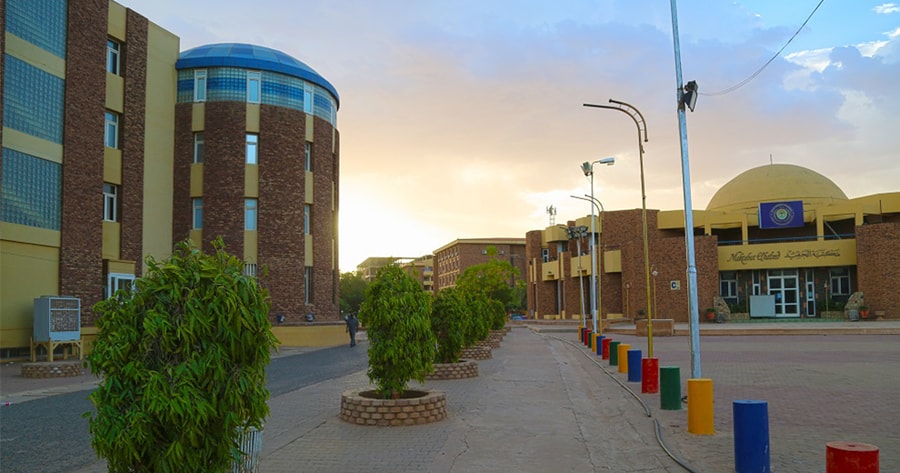
Ahfad University for Women (AUW)
March is Women’s History Month! And this year, the 2019 theme for Women’s History Month is ‘Visionary Women: Champions of Peace and Nonviolence’.
As the National Women’s History Alliance said:
‘For generations, women have resolved conflicts in their homes, schools, and communities. They have rejected violence as counterproductive and stressed the need to restore respect, establish justice, and reduce the causes of conflict as the surest way to peace.’
‘From women’s rights and racial justice to disarmament and gun control, the drive for nonviolent change has been championed by visionary women. These women consciously built supportive, nonviolent alternatives and loving communities as well as advocating change. They have given voice to the unrepresented and hope to victims of violence and those who dream of a peaceful world.’
Sudan’s history is rich with stories of women who were strong champions and advocates of peace through different wars. But looking back as the history of women and the women’s movement in Sudan, a valuable player has been the Ahfad University for Women (AUW), which many of Sudan’s visionary women and men. AUW has established itself as a forward-thinking educational institute for women in Africa.
It provides a necessary foundation for the creation of sustainable and peaceful communities, highlighting the active participation of students in rural extension involvement programmes, targeting disadvantaged families and areas, and establishing a quota of reduced fees and/or scholarships for rural and underprivileged female students. In addition, it develops leadership and social civic engagement skills such as in the Talents Program required in the university and celebrating Women’s Week and International Food Day.
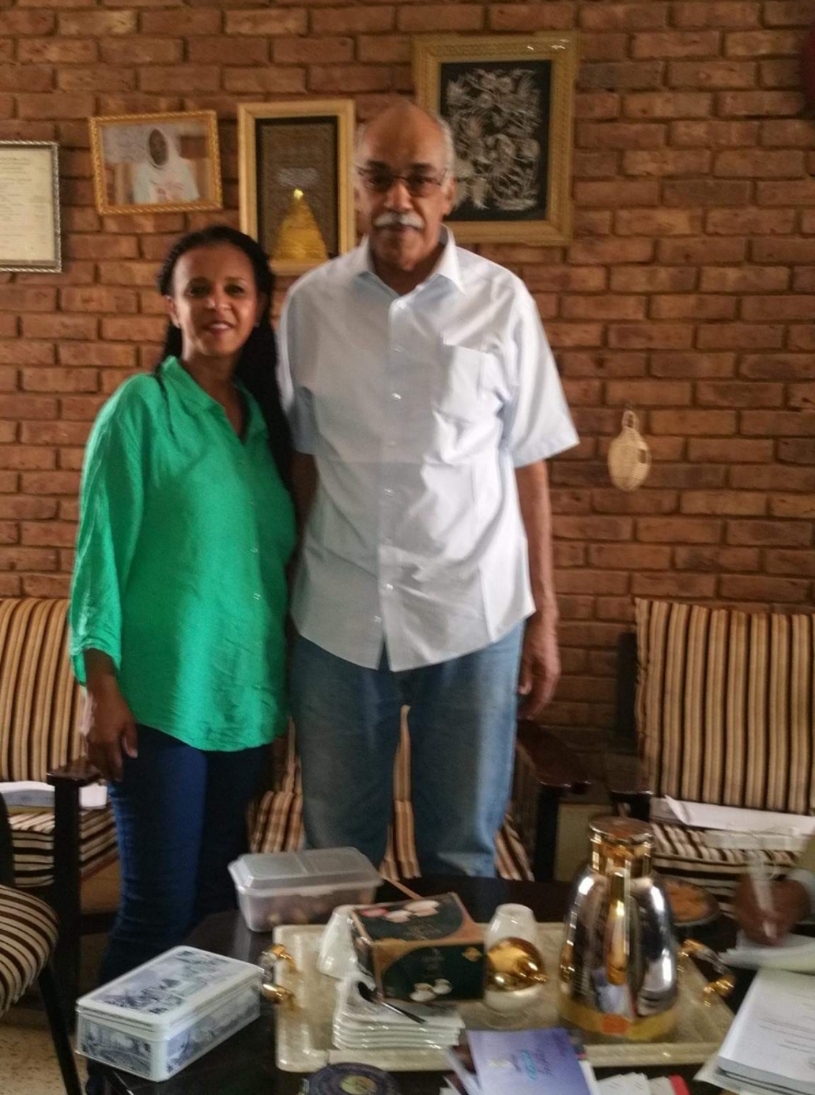
26 April, 2018 – Terhas Berhane with Dr. Gasim Badri, Dean of AUW.
Based in Omdurman, AUW was founded by the late Sheikh Babiker Badri (1860 – 1954) who was known as a social activist and laid the foundations for women’s education in Sudan. Sheikh Babiker established the first secular school for girls in Sudan at Rufa’a in 1907. In 1951, the Ahfad Girls’ Intermediate School was established in Omdurman, and in 1955, and Sheikh Bardi’s son, Professor Yousif Badri (1912 – 1995) established the Ahfad Girls’ Secondary School. Ahfad University College for Women was later founded at the school’s site in Omdurman in 1966. The Ministry of Education granted the new college the right to confer diploma certificates upon completion of its four-year programme. In 1984, an act of the National Council for Higher Education authorised the college to confer Bachelor of Science and Bachelor of Arts degrees. In 1995, President Omar Al Bashir signed a decree to elevate the college to university status which was named Ahfad University for Women (AUW).
Today, AUW spreads over around 80,000 square metres with a campus consisting of 21 buildings, including faculty and administrative buildings, one library, and the medical center.
As an AUW graduate, I would be remiss not to highlight AUW’s invaluable contributions to Sudan, especially in support of women. The mere fact that it’s the first and only all-women university in Sudan demonstrates its significance. In addition, AUW provides some of the best academic programmes in Sudan including The Regional Institute of Gender, Peace and Rights (RIGDPR) and Early Childhood Development Center, to the university’s outreach efforts that include the Rural Extension Program, Family Attachment Program, and the Student Attachment Program.
Each of these different initiatives and programmes serve to highlight the important role women play in the society and the need to empower them with the right tools so they are able to serve as active change agents in their societies.
Since its inception in 1966, AUW has recognised the importance of the active contribution and involvement of universities in and for the promotion of the community. By initiating the Engaged African University as a model in which civic engagement is integrated into academic research and extra-curricular programmes, AUW goes beyond the classroom and reaches war-affected, displaced, and economically disadvantaged Sudanese communities.
This is specially true in regards to the Rural Extension Program, which started at the university in 1973 in the form of scientific field trips for students to explore the lives of rural people and learn about appropriate forms of intervention to improve their lives.
Per AUW, The Rural Extension Program was initiated to achieve many objectives, but its main focuses are to do the following:
- Expose students to issues of rural life and train them to deal with these issues
- Contribute to the improvement of the quality of life in rural communities, especially of rural women
- Practice methods of social research in gathering and analysing data related to the needs of rural communities
- Train students in the field of development and encourage them to act as agents of change
The participants in this programme are the university students and faculty, as well as government officials and NGOs operating in the designated area. The university receives funds for the field trips from UN agencies and NGOs. Other contributors to the programme are donors, local communities, local authorities, national and local NGOs, and academic institutions in the area.
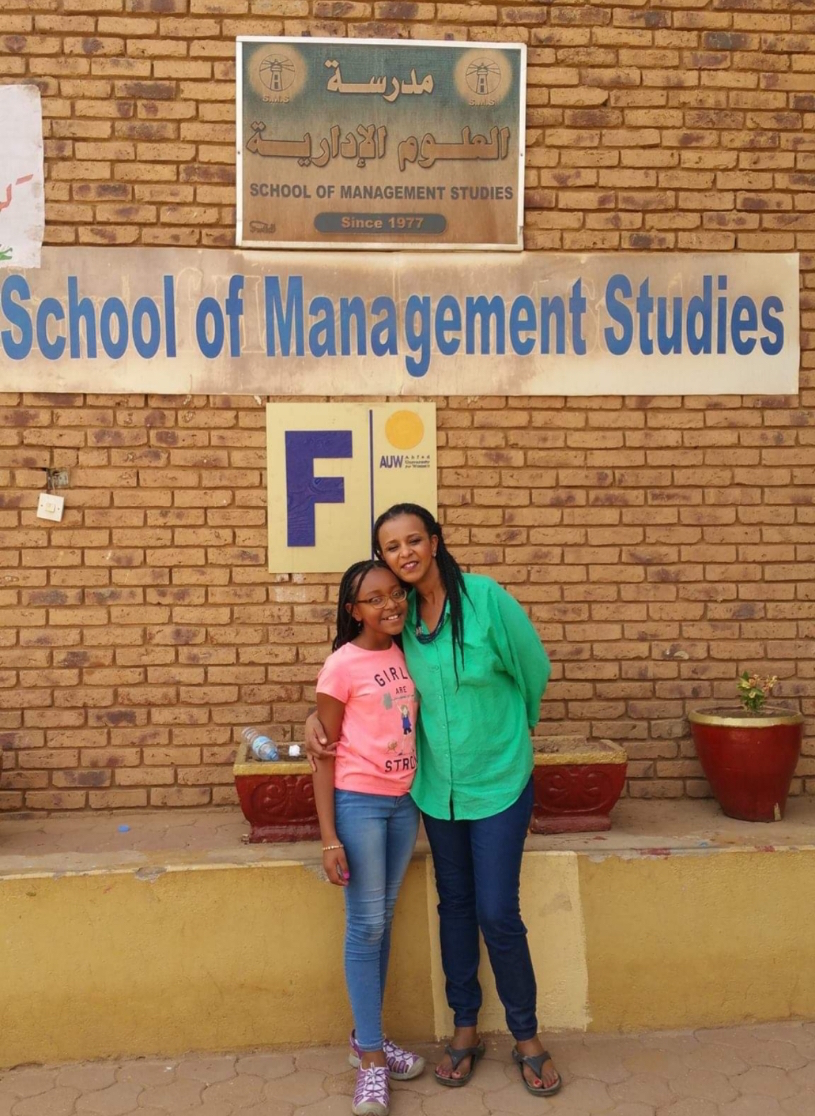
26 April 2017 – Terhas Berhane with her daughter Timnit at AUW
It is the university’s conviction that the programme has proved to be very successful. Students have gained valuable experience and training, and have developed a positive attitude towards and respect for human rights, as well as an appreciation of the diversity of rural life. Numerous studies have emanated from this programme (many of which are published), and training manuals have been developed.
As a young student in AUW’s School of Management back in the 1980s, I have very fond memories of the field trip I took with my fellow students to Sinkat, Eastern Sudan. I can definitely attest to the fact that it helped me connect with the rural community in a way that wouldn’t have been possible. We were expected to interact directly with the community and went door-to-door visiting with local women to help them gain a better understanding of the importance of hygiene and the negative impacts of FGM. We were always welcome and the families we visited treated us like their daughters, serving us tea and helping us find our way around town. We also engaged the community in clean-ups outside their doors so everyone can later take personal responsibility of their own space. This trip will forever be etched in my memory and I don’t miss a chance to share it with friends and colleagues.
One of the direct results of this programme was the establishment of the School of Rural Extension Education and Development (REED) in 1987. The school prepares graduates to become agents of change in rural communities. The school also offers a master’s degree in sustainable development, which is unique in Sudan and offered only by the AUW.
Through education, AUW is empowering women to be agents of change.
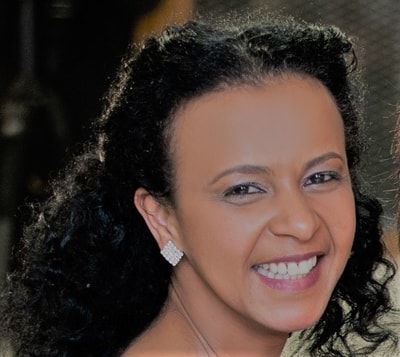 Terhas Berhane-Rwakaara is an Eritrean-Ethiopian, born and raised in Sudan. Now based in the US, she is currently a full-time management employee with two children. With high family and community values, faith and family are her priorities. She is also a huge advocate of civic duty and volunteerism, and is passionate about mentoring women. Diagnosed with ADHD as an adult, she feels the responsibility to do more to raise awareness and remove the stigma associated with mental illness in her culture.
Terhas Berhane-Rwakaara is an Eritrean-Ethiopian, born and raised in Sudan. Now based in the US, she is currently a full-time management employee with two children. With high family and community values, faith and family are her priorities. She is also a huge advocate of civic duty and volunteerism, and is passionate about mentoring women. Diagnosed with ADHD as an adult, she feels the responsibility to do more to raise awareness and remove the stigma associated with mental illness in her culture.
Stay tuned for more articles from Terhas, where she shares her personal journey dealing with ADHD, and stories of women and expert interviews on mental health.

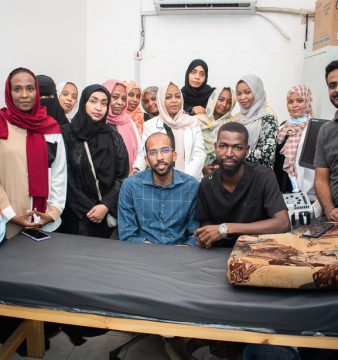
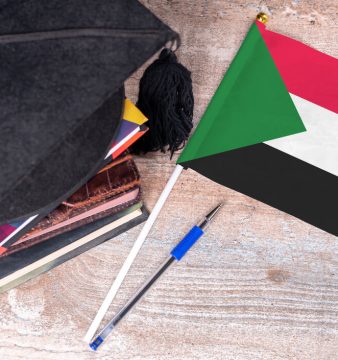
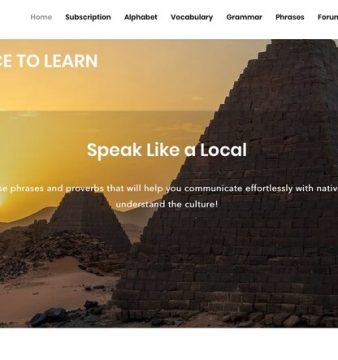
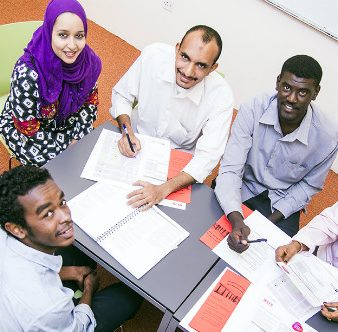
An inspiration for all Women around the world. Ahfad is a university that is a trail blazer for women on Africa